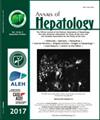A comprehensive meta-analysis of stem cell therapy for liver failure: Assessing treatment efficacy and modality
IF 3.7
3区 医学
Q2 GASTROENTEROLOGY & HEPATOLOGY
引用次数: 0
Abstract
Introduction and Objectives
This meta-analysis aims to evaluate the efficacy of stem cell therapy (SCT) for liver failure.
Materials and Methods
The study adhered to the recommended guidelines of the PRISMA statement. Eligible studies published prior to May 13, 2023, were comprehensively searched in databases including PubMed, Web of Science, and Embase. Quality assessment was conducted using the Cochrane risk-of-bias tool, and the standard mean differences were calculated for the clinical parameters. The hazard ratios were determined by extracting individual patient data from the Kaplan-Meier curve.
Results
A total of 2,937 articles were retrieved, and eight studies were included in the final analysis. Most of the studies focused on HBV-related liver failure and were randomized controlled trials. All studies utilized mesenchymal stem cells (MSCs), with the majority (62.5%) being allogeneic. The analysis revealed that combining stem cell therapy with standard medical treatment or plasma exchange significantly enhanced patient survival and reduced MELD scores. Specifically, allogeneic stem cells showed superior efficacy in improving survival outcomes compared to autologous stem cells. Furthermore, deep vessel injection plus a single injection demonstrated better effectiveness than peripheral vessel injection plus multiple injections in reducing MELD scores.
Conclusions
This comprehensive analysis underscores the potential of MSC therapy in significantly improving survival and clinical outcomes in patients with liver failure, highlighting the superior benefits of allogeneic MSCs and deep vessel plus single injection administration.
干细胞治疗肝衰竭的综合荟萃分析:评估治疗效果和方式。
引言与目的本荟萃分析旨在评估干细胞疗法(SCT)治疗肝衰竭的疗效。在PubMed、Web of Science和Embase等数据库中全面检索了2023年5月13日之前发表的符合条件的研究。使用 Cochrane 偏倚风险工具进行了质量评估,并计算了临床参数的标准平均差。结果共检索到 2,937 篇文章,最终分析纳入了 8 项研究。大部分研究侧重于 HBV 相关肝衰竭,并且是随机对照试验。所有研究都使用了间充质干细胞,其中大部分(62.5%)为异体干细胞。分析显示,干细胞疗法与标准药物治疗或血浆置换相结合,可显著提高患者存活率,降低MELD评分。具体而言,与自体干细胞相比,异体干细胞在改善生存结果方面表现出更优越的疗效。此外,在降低MELD评分方面,深部血管注射加单次注射比外周血管注射加多次注射显示出更好的疗效。
本文章由计算机程序翻译,如有差异,请以英文原文为准。
求助全文
约1分钟内获得全文
求助全文
来源期刊

Annals of hepatology
医学-胃肠肝病学
CiteScore
7.90
自引率
2.60%
发文量
183
审稿时长
4-8 weeks
期刊介绍:
Annals of Hepatology publishes original research on the biology and diseases of the liver in both humans and experimental models. Contributions may be submitted as regular articles. The journal also publishes concise reviews of both basic and clinical topics.
 求助内容:
求助内容: 应助结果提醒方式:
应助结果提醒方式:


